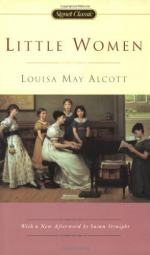“Which did she choose?” asked one of the laughing gentlemen, who enjoyed the subject.
“None of them. She heard of a young horse at the farm house over the river, and though a lady had never ridden him, she resolved to try, because he was handsome and spirited. Her struggles were really pathetic. There was no one to bring the horse to the saddle, so she took the saddle to the horse. My dear creature, she actually rowed it over the river, put it on her head, and marched up to the barn to the utter amazement of the old man!”
“Did she ride the horse?”
“Of course she did, and had a capital time. I expected to see her brought home in fragments, but she managed him perfectly, and was the life of the party.”
“Well, I call that plucky!” and young Mr. Lamb turned an approving glance upon Amy, wondering what his mother could be saying to make the girl look so red and uncomfortable.
She was still redder and more uncomfortable a moment after, when a sudden turn in the conversation introduced the subject of dress. One of the young ladies asked Jo where she got the pretty drab hat she wore to the picnic and stupid Jo, instead of mentioning the place where it was bought two years ago, must needs answer with unnecessary frankness, “Oh, Amy painted it. You can’t buy those soft shades, so we paint ours any color we like. It’s a great comfort to have an artistic sister.”
“Isn’t that an original idea?” cried Miss Lamb, who found Jo great fun.
“That’s nothing compared to some of her brilliant performances. There’s nothing the child can’t do. Why, she wanted a pair of blue boots for Sallie’s party, so she just painted her soiled white ones the loveliest shade of sky blue you ever saw, and they looked exactly like satin,” added Jo, with an air of pride in her sister’s accomplishments that exasperated Amy till she felt that it would be a relief to throw her cardcase at her.
“We read a story of yours the other day, and enjoyed it very much,” observed the elder Miss Lamb, wishing to compliment the literary lady, who did not look the character just then, it must be confessed.
Any mention of her ‘works’ always had a bad effect upon Jo, who either grew rigid and looked offended, or changed the subject with a brusque remark, as now. “Sorry you could find nothing better to read. I write that rubbish because it sells, and ordinary people like it. Are you going to New York this winter?”
As Miss Lamb had ‘enjoyed’ the story, this speech was not exactly grateful or complimentary. The minute it was made Jo saw her mistake, but fearing to make the matter worse, suddenly remembered that it was for her to make the first move toward departure, and did so with an abruptness that left three people with half-finished sentences in their mouths.
“Amy, we must go. Good-by, dear, do come and see us. We are pining for a visit. I don’t dare to ask you, Mr. Lamb, but if you should come, I don’t think I shall have the heart to send you away.”




